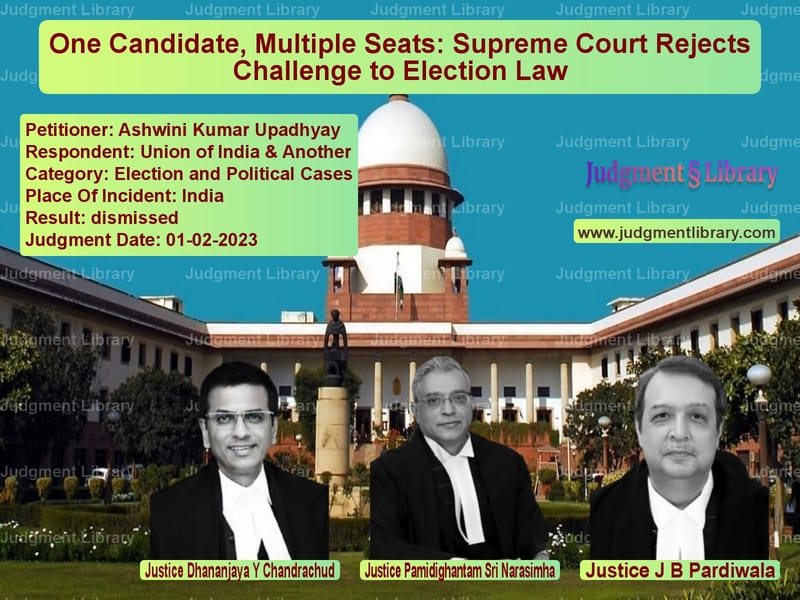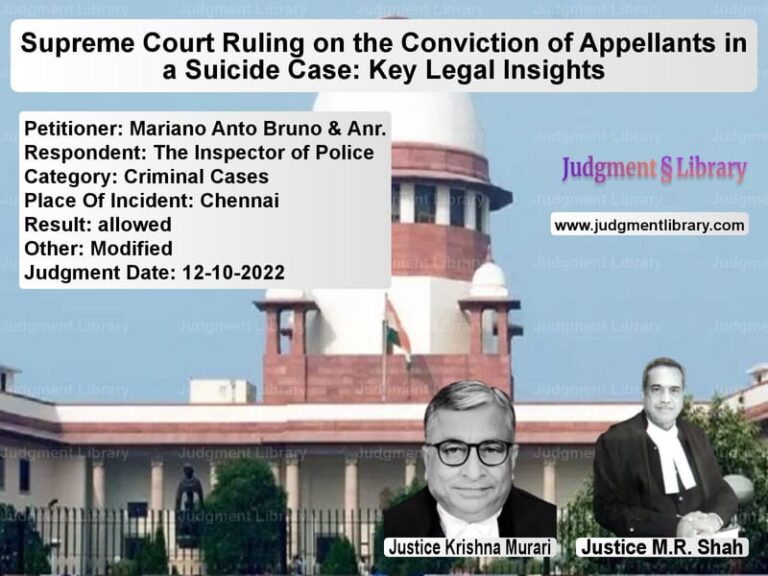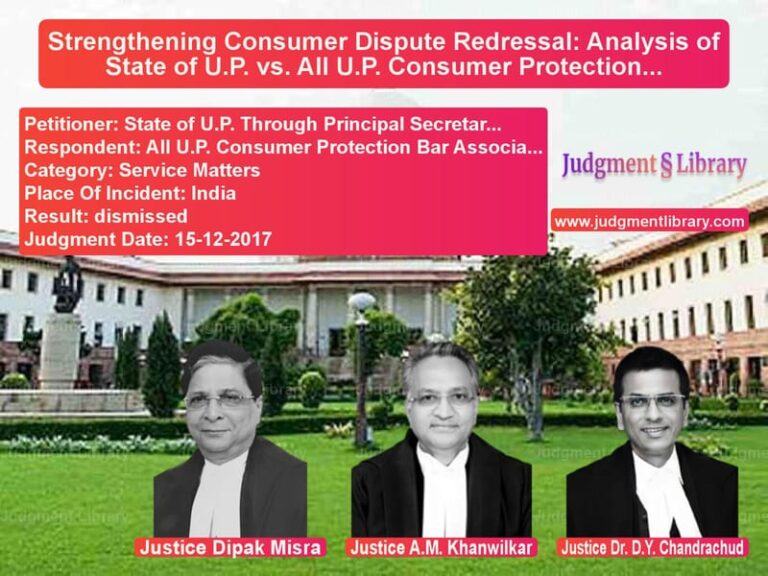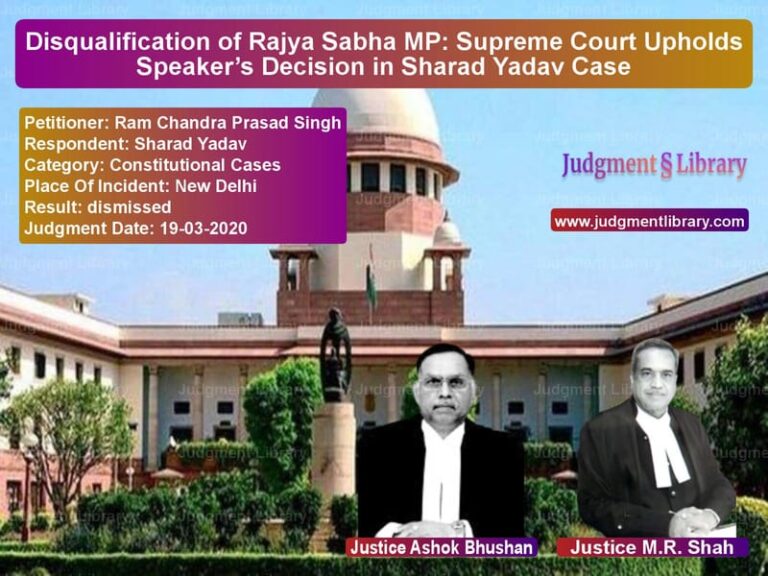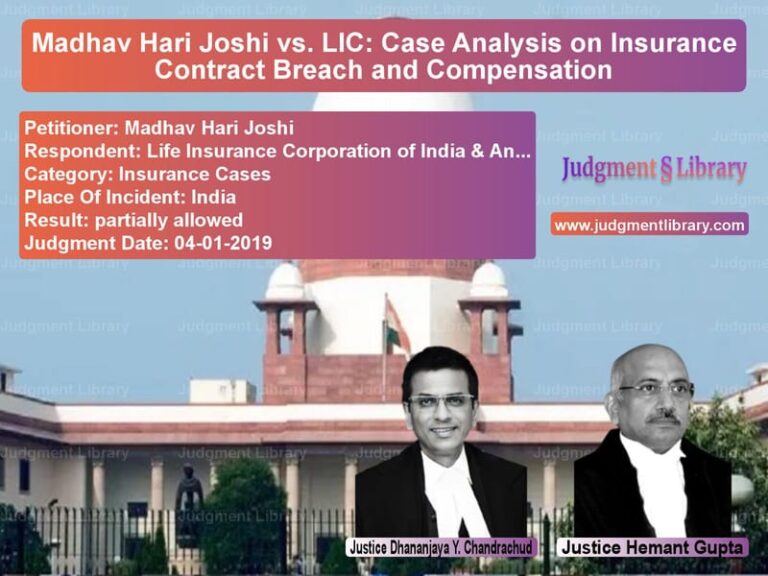One Candidate, Multiple Seats: Supreme Court Rejects Challenge to Election Law
The Supreme Court of India recently addressed a petition challenging the validity of Section 33(7) of the Representation of the People Act, 1951. This provision allows a candidate to contest elections from two constituencies simultaneously. The case, Ashwini Kumar Upadhyay vs. Union of India & Another, raised concerns about the financial and democratic implications of this provision, including the burden on the exchequer and the rights of voters.
Background of the Case
The petitioner, Ashwini Kumar Upadhyay, argued that allowing a candidate to contest from multiple constituencies burdens the electoral system and leads to unnecessary bye-elections. The petition cited recommendations from the Election Commission of India and the Law Commission’s 255th report, both of which suggested amending the law to restrict candidates to one seat per election.
Additionally, the petitioner contended that the practice of contesting from multiple seats affects the electorate’s right under Article 19(1)(a) of the Constitution, as voters are often left without representation when a candidate vacates one seat after winning from two constituencies.
Arguments by the Petitioner
- The petitioner claimed that allowing a candidate to contest from two seats violates the fundamental rights of voters, as it deprives them of representation when the candidate vacates one seat.
- The financial burden on the exchequer due to bye-elections is unjustifiable.
- The Election Commission and Law Commission have both recommended restricting candidates to one seat, but no action has been taken.
Arguments by the Government and Election Commission
- The Attorney General for India argued that the provision falls within the legislative domain and is a matter of policy.
- Permitting candidates to contest from two seats is a political decision taken by Parliament to ensure broader electoral participation.
- There is no constitutional violation in allowing candidates to contest from two seats, as it does not infringe upon any fundamental rights.
Supreme Court’s Analysis and Judgment
The Supreme Court examined whether the provision violates the Constitution and whether it falls within the permissible legislative framework. The key observations made by the Court were:
- Legislative Policy: The Court noted that allowing candidates to contest from more than one seat is a matter of legislative policy. It is for Parliament to decide whether such a provision should be retained or removed.
- Financial Burden: The Court acknowledged the financial cost of bye-elections but stated that this alone does not make the provision unconstitutional.
- No Violation of Fundamental Rights: The Court found no violation of Article 19(1)(a) or Article 14 of the Constitution, as the provision applies equally to all candidates and does not restrict voter rights.
The Court ultimately dismissed the petition, stating:
“Permitting a candidate to contest from more than one seat in a Parliamentary election or at an election to the State Legislative Assembly is a matter of legislative policy. It is a matter pertaining to legislative policy since, ultimately, Parliament determines whether political democracy in the country is furthered by granting a choice such as is made available by Section 33(7) of the Act of 1951.”
The judgment reaffirmed that policy decisions of this nature fall within the purview of Parliament, and unless a provision is manifestly arbitrary or unconstitutional, the Court will not interfere.
Final Verdict
- The Supreme Court dismissed the petition, upholding the validity of Section 33(7) of the Representation of the People Act, 1951.
- The Court ruled that it is up to Parliament to amend the law if it deems fit.
- The judgment reinforced the principle that legislative policy decisions should not be overturned unless they are unconstitutional.
With this ruling, the Supreme Court has left the decision to restrict multiple-seat candidacies to the lawmakers, emphasizing the importance of parliamentary sovereignty in electoral matters.
Petitioner Name: Ashwini Kumar Upadhyay.Respondent Name: Union of India & Another.Judgment By: Justice Dhananjaya Y Chandrachud, Justice Pamidighantam Sri Narasimha, Justice J B Pardiwala.Place Of Incident: India.Judgment Date: 01-02-2023.
Don’t miss out on the full details! Download the complete judgment in PDF format below and gain valuable insights instantly!
Download Judgment: ashwini-kumar-upadhy-vs-union-of-india-&-ano-supreme-court-of-india-judgment-dated-01-02-2023.pdf
Directly Download Judgment: Directly download this Judgment
See all petitions in Legislative Powers
See all petitions in Public Interest Litigation
See all petitions in Judgment by Dhananjaya Y Chandrachud
See all petitions in Judgment by P.S. Narasimha
See all petitions in Judgment by J.B. Pardiwala
See all petitions in dismissed
See all petitions in supreme court of India judgments February 2023
See all petitions in 2023 judgments
See all posts in Election and Political Cases Category
See all allowed petitions in Election and Political Cases Category
See all Dismissed petitions in Election and Political Cases Category
See all partially allowed petitions in Election and Political Cases Category

